Analysis of Directors' Duties under Business Law: SkyTrans Case
VerifiedAdded on 2021/06/14
|15
|3314
|39
Report
AI Summary
This report analyzes the case of SkyTrans, focusing on the actions of its directors, Simon and Marilou, and their compliance with the Corporations Act 2001 (Cth). The report addresses three key issues: the directors' compliance with statutory duties under sections 180-184, the potential breach of section 191 regarding disclosure of personal interests, and the observance of insolvent trading rules under section 588G. The analysis examines the directors' actions, such as Simon's failure to pay suppliers, the purchase of luxury cars, and lavish spending during financial difficulties, in relation to their duties of care, good faith, and proper use of position and information. The report concludes that Simon and Marilou have contravened several provisions of the Act, including sections 180, 181, 182, 183, 191, and 588G, due to breaches of directors' duties and potentially engaging in insolvent trading. The report applies legal principles to the facts, providing a detailed assessment of the directors' responsibilities and potential liabilities.
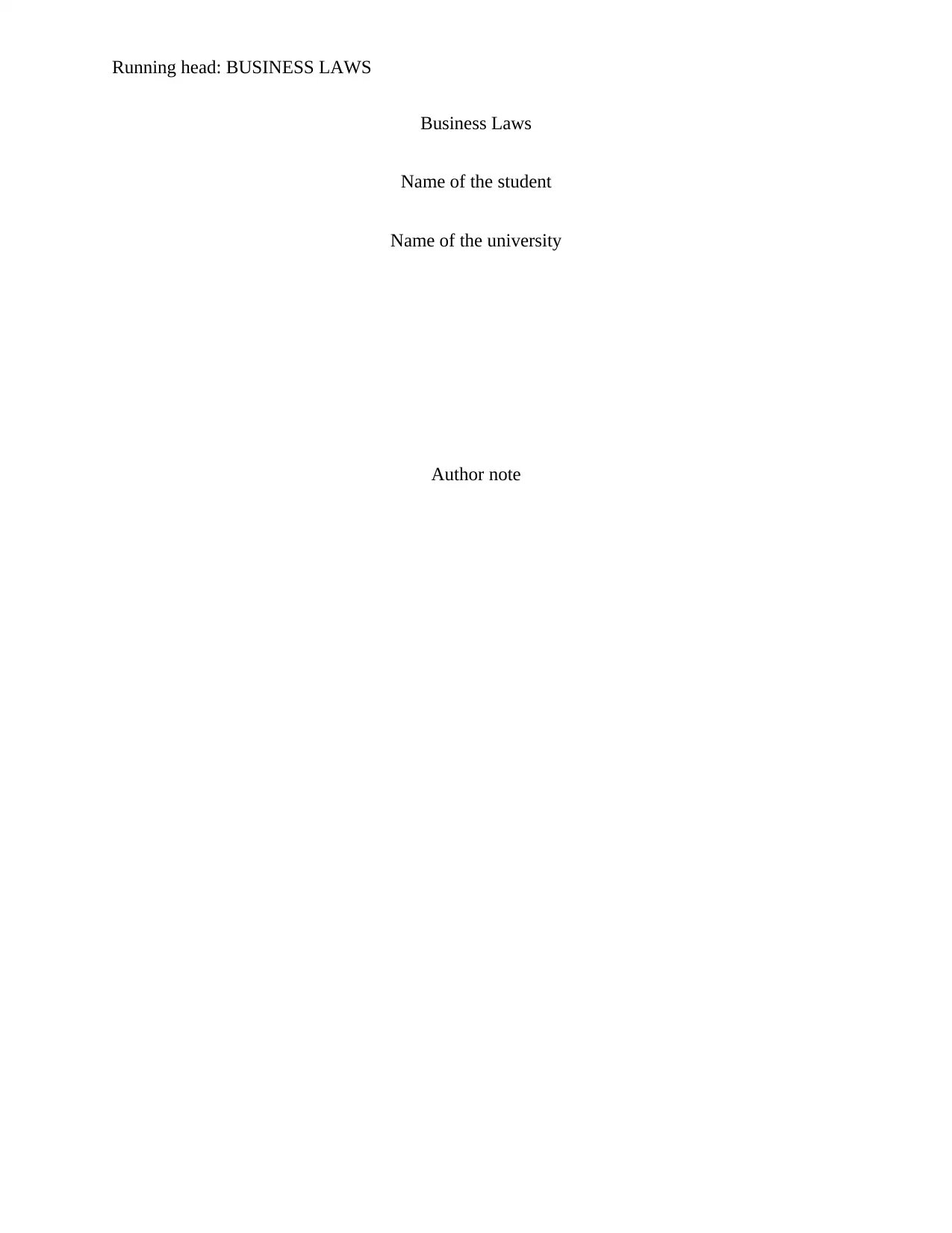
Running head: BUSINESS LAWS
Business Laws
Name of the student
Name of the university
Author note
Business Laws
Name of the student
Name of the university
Author note
Paraphrase This Document
Need a fresh take? Get an instant paraphrase of this document with our AI Paraphraser
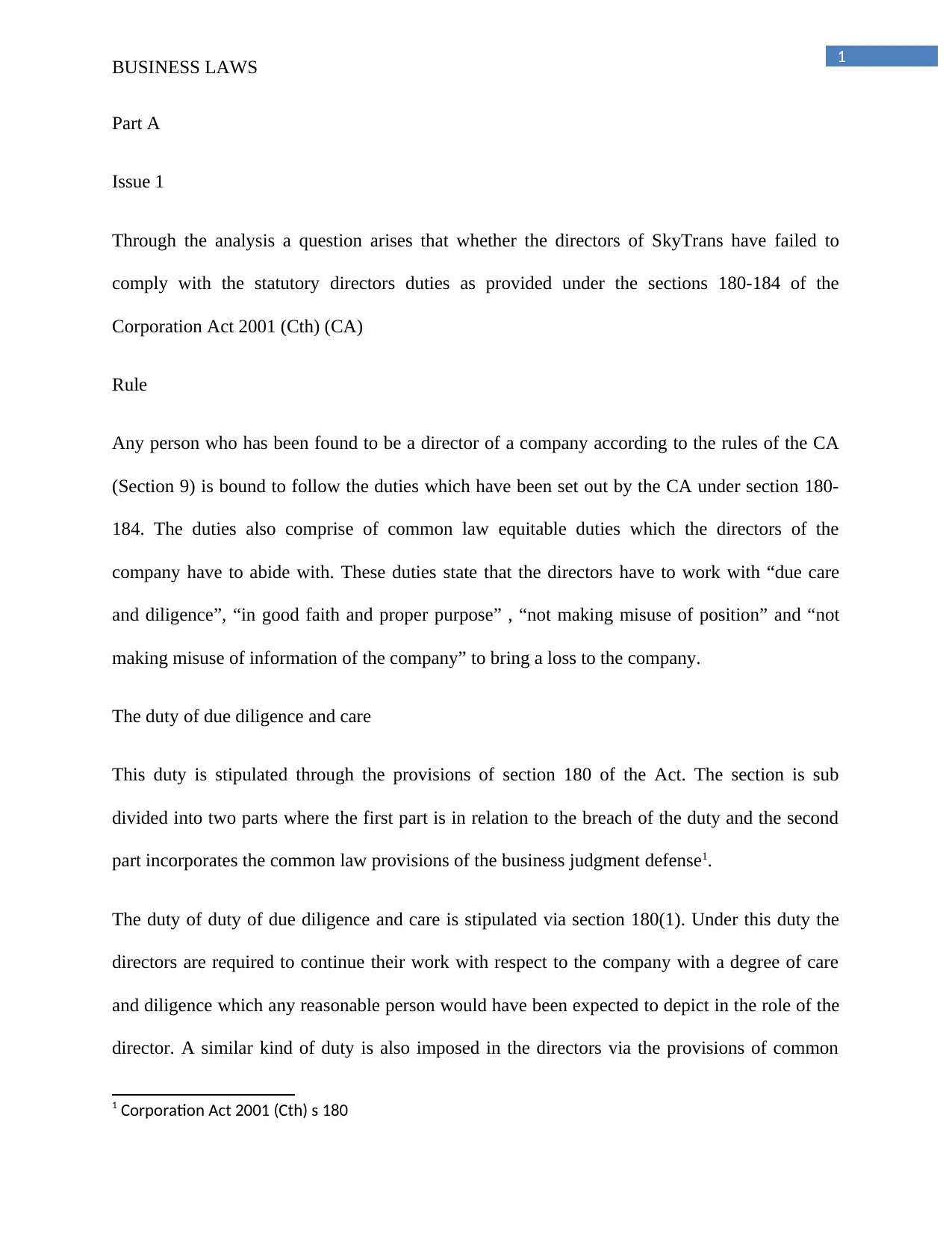
1
BUSINESS LAWS
Part A
Issue 1
Through the analysis a question arises that whether the directors of SkyTrans have failed to
comply with the statutory directors duties as provided under the sections 180-184 of the
Corporation Act 2001 (Cth) (CA)
Rule
Any person who has been found to be a director of a company according to the rules of the CA
(Section 9) is bound to follow the duties which have been set out by the CA under section 180-
184. The duties also comprise of common law equitable duties which the directors of the
company have to abide with. These duties state that the directors have to work with “due care
and diligence”, “in good faith and proper purpose” , “not making misuse of position” and “not
making misuse of information of the company” to bring a loss to the company.
The duty of due diligence and care
This duty is stipulated through the provisions of section 180 of the Act. The section is sub
divided into two parts where the first part is in relation to the breach of the duty and the second
part incorporates the common law provisions of the business judgment defense1.
The duty of duty of due diligence and care is stipulated via section 180(1). Under this duty the
directors are required to continue their work with respect to the company with a degree of care
and diligence which any reasonable person would have been expected to depict in the role of the
director. A similar kind of duty is also imposed in the directors via the provisions of common
1 Corporation Act 2001 (Cth) s 180
BUSINESS LAWS
Part A
Issue 1
Through the analysis a question arises that whether the directors of SkyTrans have failed to
comply with the statutory directors duties as provided under the sections 180-184 of the
Corporation Act 2001 (Cth) (CA)
Rule
Any person who has been found to be a director of a company according to the rules of the CA
(Section 9) is bound to follow the duties which have been set out by the CA under section 180-
184. The duties also comprise of common law equitable duties which the directors of the
company have to abide with. These duties state that the directors have to work with “due care
and diligence”, “in good faith and proper purpose” , “not making misuse of position” and “not
making misuse of information of the company” to bring a loss to the company.
The duty of due diligence and care
This duty is stipulated through the provisions of section 180 of the Act. The section is sub
divided into two parts where the first part is in relation to the breach of the duty and the second
part incorporates the common law provisions of the business judgment defense1.
The duty of duty of due diligence and care is stipulated via section 180(1). Under this duty the
directors are required to continue their work with respect to the company with a degree of care
and diligence which any reasonable person would have been expected to depict in the role of the
director. A similar kind of duty is also imposed in the directors via the provisions of common
1 Corporation Act 2001 (Cth) s 180
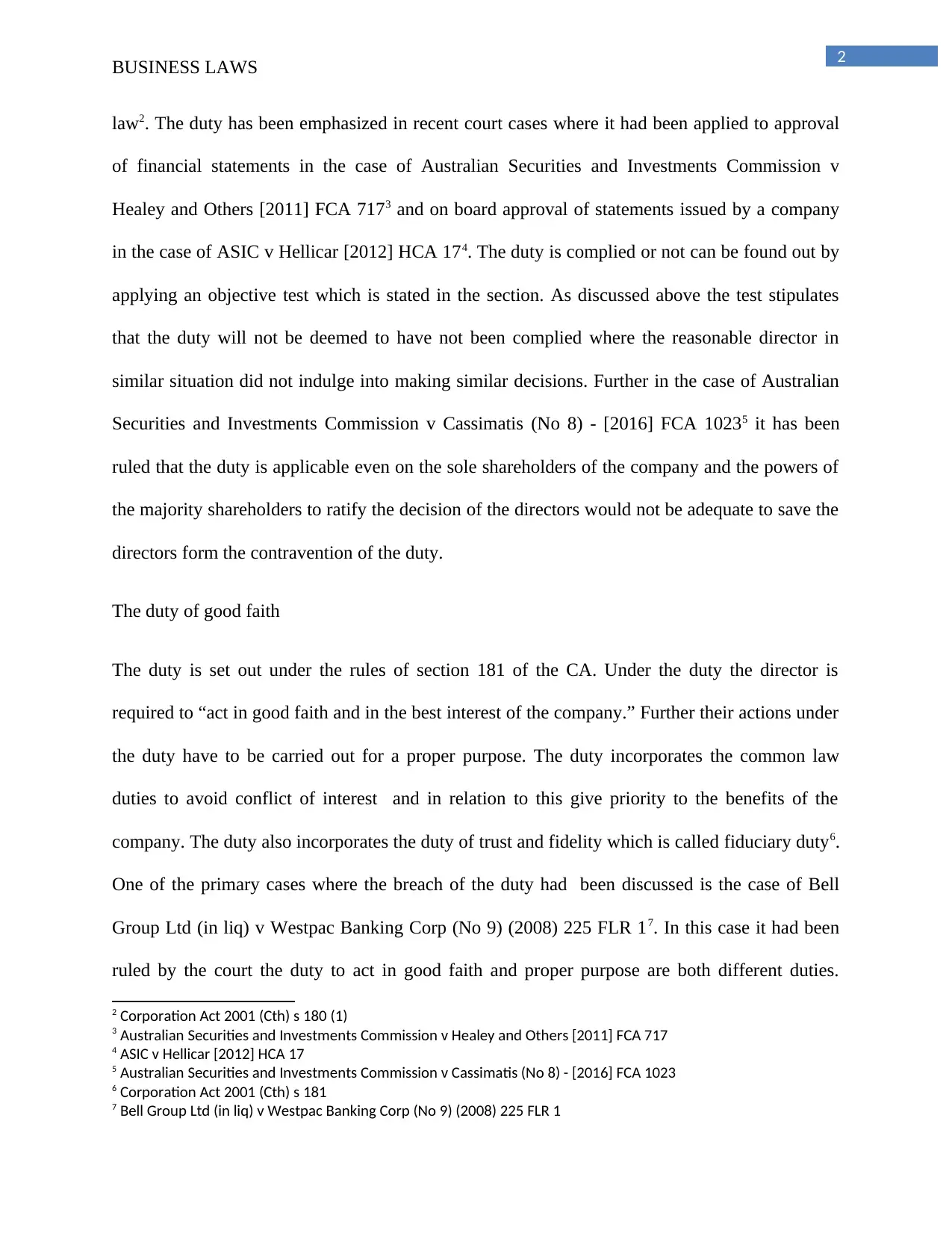
2
BUSINESS LAWS
law2. The duty has been emphasized in recent court cases where it had been applied to approval
of financial statements in the case of Australian Securities and Investments Commission v
Healey and Others [2011] FCA 7173 and on board approval of statements issued by a company
in the case of ASIC v Hellicar [2012] HCA 174. The duty is complied or not can be found out by
applying an objective test which is stated in the section. As discussed above the test stipulates
that the duty will not be deemed to have not been complied where the reasonable director in
similar situation did not indulge into making similar decisions. Further in the case of Australian
Securities and Investments Commission v Cassimatis (No 8) - [2016] FCA 10235 it has been
ruled that the duty is applicable even on the sole shareholders of the company and the powers of
the majority shareholders to ratify the decision of the directors would not be adequate to save the
directors form the contravention of the duty.
The duty of good faith
The duty is set out under the rules of section 181 of the CA. Under the duty the director is
required to “act in good faith and in the best interest of the company.” Further their actions under
the duty have to be carried out for a proper purpose. The duty incorporates the common law
duties to avoid conflict of interest and in relation to this give priority to the benefits of the
company. The duty also incorporates the duty of trust and fidelity which is called fiduciary duty6.
One of the primary cases where the breach of the duty had been discussed is the case of Bell
Group Ltd (in liq) v Westpac Banking Corp (No 9) (2008) 225 FLR 17. In this case it had been
ruled by the court the duty to act in good faith and proper purpose are both different duties.
2 Corporation Act 2001 (Cth) s 180 (1)
3 Australian Securities and Investments Commission v Healey and Others [2011] FCA 717
4 ASIC v Hellicar [2012] HCA 17
5 Australian Securities and Investments Commission v Cassimatis (No 8) - [2016] FCA 1023
6 Corporation Act 2001 (Cth) s 181
7 Bell Group Ltd (in liq) v Westpac Banking Corp (No 9) (2008) 225 FLR 1
BUSINESS LAWS
law2. The duty has been emphasized in recent court cases where it had been applied to approval
of financial statements in the case of Australian Securities and Investments Commission v
Healey and Others [2011] FCA 7173 and on board approval of statements issued by a company
in the case of ASIC v Hellicar [2012] HCA 174. The duty is complied or not can be found out by
applying an objective test which is stated in the section. As discussed above the test stipulates
that the duty will not be deemed to have not been complied where the reasonable director in
similar situation did not indulge into making similar decisions. Further in the case of Australian
Securities and Investments Commission v Cassimatis (No 8) - [2016] FCA 10235 it has been
ruled that the duty is applicable even on the sole shareholders of the company and the powers of
the majority shareholders to ratify the decision of the directors would not be adequate to save the
directors form the contravention of the duty.
The duty of good faith
The duty is set out under the rules of section 181 of the CA. Under the duty the director is
required to “act in good faith and in the best interest of the company.” Further their actions under
the duty have to be carried out for a proper purpose. The duty incorporates the common law
duties to avoid conflict of interest and in relation to this give priority to the benefits of the
company. The duty also incorporates the duty of trust and fidelity which is called fiduciary duty6.
One of the primary cases where the breach of the duty had been discussed is the case of Bell
Group Ltd (in liq) v Westpac Banking Corp (No 9) (2008) 225 FLR 17. In this case it had been
ruled by the court the duty to act in good faith and proper purpose are both different duties.
2 Corporation Act 2001 (Cth) s 180 (1)
3 Australian Securities and Investments Commission v Healey and Others [2011] FCA 717
4 ASIC v Hellicar [2012] HCA 17
5 Australian Securities and Investments Commission v Cassimatis (No 8) - [2016] FCA 1023
6 Corporation Act 2001 (Cth) s 181
7 Bell Group Ltd (in liq) v Westpac Banking Corp (No 9) (2008) 225 FLR 1
⊘ This is a preview!⊘
Do you want full access?
Subscribe today to unlock all pages.

Trusted by 1+ million students worldwide
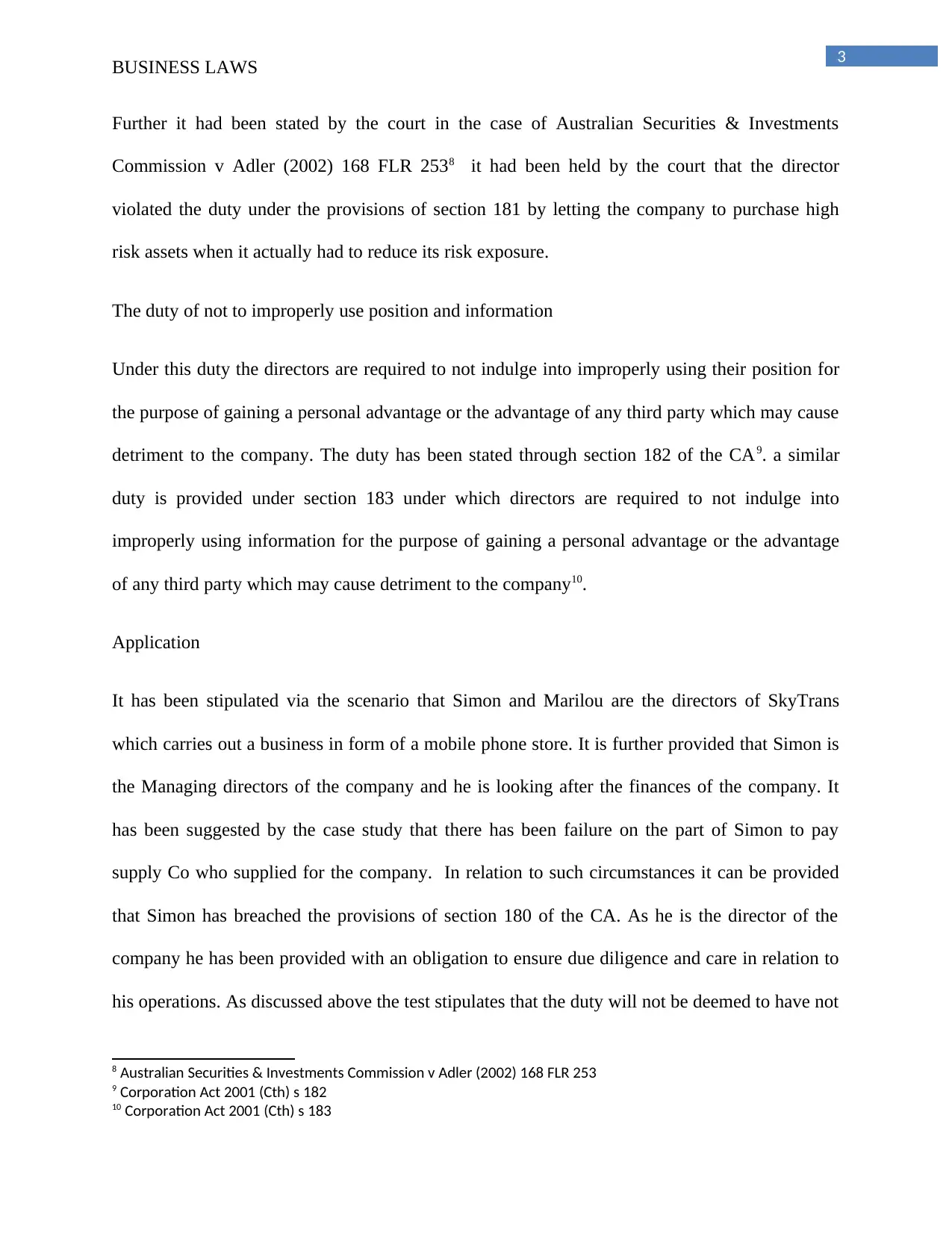
3
BUSINESS LAWS
Further it had been stated by the court in the case of Australian Securities & Investments
Commission v Adler (2002) 168 FLR 2538 it had been held by the court that the director
violated the duty under the provisions of section 181 by letting the company to purchase high
risk assets when it actually had to reduce its risk exposure.
The duty of not to improperly use position and information
Under this duty the directors are required to not indulge into improperly using their position for
the purpose of gaining a personal advantage or the advantage of any third party which may cause
detriment to the company. The duty has been stated through section 182 of the CA9. a similar
duty is provided under section 183 under which directors are required to not indulge into
improperly using information for the purpose of gaining a personal advantage or the advantage
of any third party which may cause detriment to the company10.
Application
It has been stipulated via the scenario that Simon and Marilou are the directors of SkyTrans
which carries out a business in form of a mobile phone store. It is further provided that Simon is
the Managing directors of the company and he is looking after the finances of the company. It
has been suggested by the case study that there has been failure on the part of Simon to pay
supply Co who supplied for the company. In relation to such circumstances it can be provided
that Simon has breached the provisions of section 180 of the CA. As he is the director of the
company he has been provided with an obligation to ensure due diligence and care in relation to
his operations. As discussed above the test stipulates that the duty will not be deemed to have not
8 Australian Securities & Investments Commission v Adler (2002) 168 FLR 253
9 Corporation Act 2001 (Cth) s 182
10 Corporation Act 2001 (Cth) s 183
BUSINESS LAWS
Further it had been stated by the court in the case of Australian Securities & Investments
Commission v Adler (2002) 168 FLR 2538 it had been held by the court that the director
violated the duty under the provisions of section 181 by letting the company to purchase high
risk assets when it actually had to reduce its risk exposure.
The duty of not to improperly use position and information
Under this duty the directors are required to not indulge into improperly using their position for
the purpose of gaining a personal advantage or the advantage of any third party which may cause
detriment to the company. The duty has been stated through section 182 of the CA9. a similar
duty is provided under section 183 under which directors are required to not indulge into
improperly using information for the purpose of gaining a personal advantage or the advantage
of any third party which may cause detriment to the company10.
Application
It has been stipulated via the scenario that Simon and Marilou are the directors of SkyTrans
which carries out a business in form of a mobile phone store. It is further provided that Simon is
the Managing directors of the company and he is looking after the finances of the company. It
has been suggested by the case study that there has been failure on the part of Simon to pay
supply Co who supplied for the company. In relation to such circumstances it can be provided
that Simon has breached the provisions of section 180 of the CA. As he is the director of the
company he has been provided with an obligation to ensure due diligence and care in relation to
his operations. As discussed above the test stipulates that the duty will not be deemed to have not
8 Australian Securities & Investments Commission v Adler (2002) 168 FLR 253
9 Corporation Act 2001 (Cth) s 182
10 Corporation Act 2001 (Cth) s 183
Paraphrase This Document
Need a fresh take? Get an instant paraphrase of this document with our AI Paraphraser
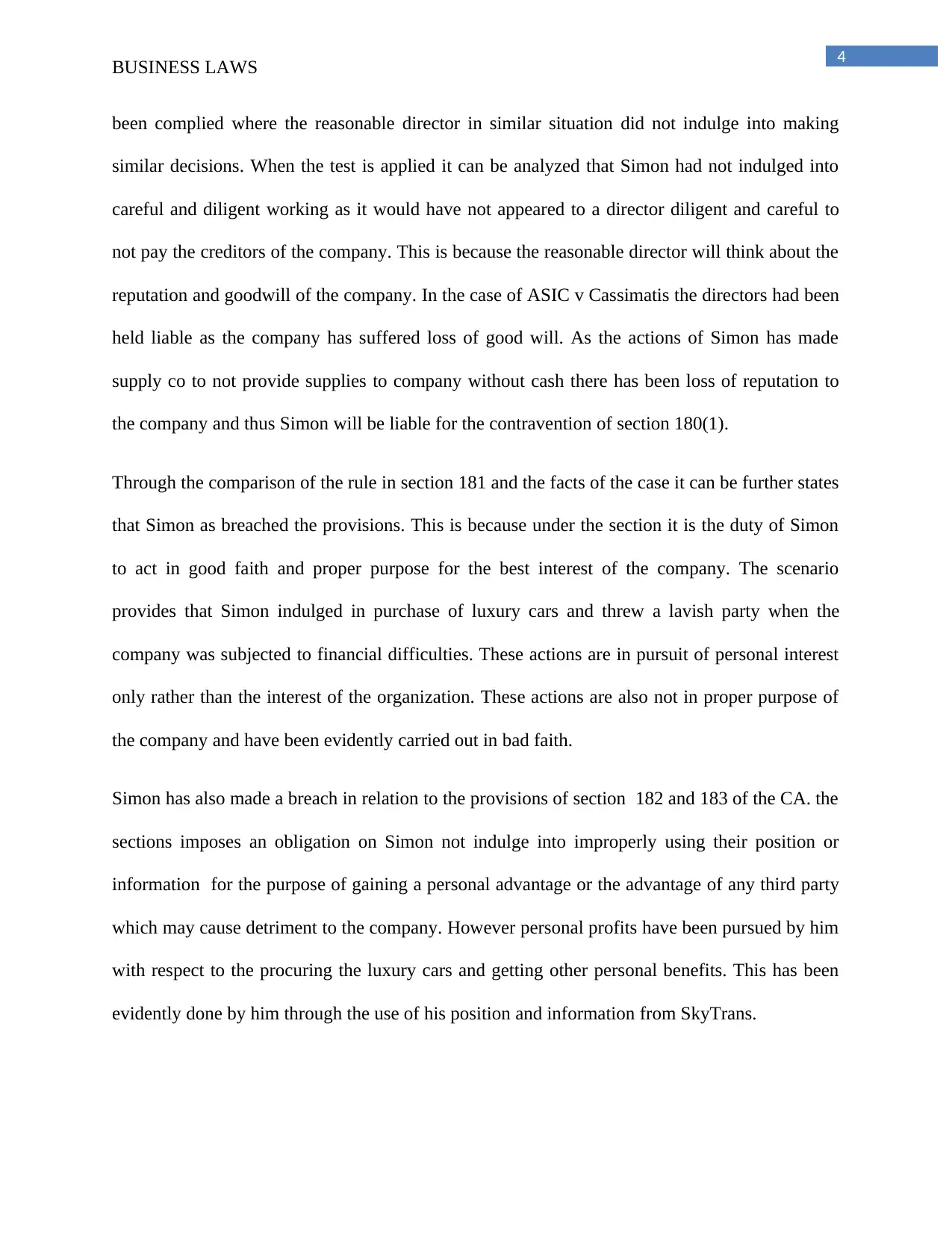
4
BUSINESS LAWS
been complied where the reasonable director in similar situation did not indulge into making
similar decisions. When the test is applied it can be analyzed that Simon had not indulged into
careful and diligent working as it would have not appeared to a director diligent and careful to
not pay the creditors of the company. This is because the reasonable director will think about the
reputation and goodwill of the company. In the case of ASIC v Cassimatis the directors had been
held liable as the company has suffered loss of good will. As the actions of Simon has made
supply co to not provide supplies to company without cash there has been loss of reputation to
the company and thus Simon will be liable for the contravention of section 180(1).
Through the comparison of the rule in section 181 and the facts of the case it can be further states
that Simon as breached the provisions. This is because under the section it is the duty of Simon
to act in good faith and proper purpose for the best interest of the company. The scenario
provides that Simon indulged in purchase of luxury cars and threw a lavish party when the
company was subjected to financial difficulties. These actions are in pursuit of personal interest
only rather than the interest of the organization. These actions are also not in proper purpose of
the company and have been evidently carried out in bad faith.
Simon has also made a breach in relation to the provisions of section 182 and 183 of the CA. the
sections imposes an obligation on Simon not indulge into improperly using their position or
information for the purpose of gaining a personal advantage or the advantage of any third party
which may cause detriment to the company. However personal profits have been pursued by him
with respect to the procuring the luxury cars and getting other personal benefits. This has been
evidently done by him through the use of his position and information from SkyTrans.
BUSINESS LAWS
been complied where the reasonable director in similar situation did not indulge into making
similar decisions. When the test is applied it can be analyzed that Simon had not indulged into
careful and diligent working as it would have not appeared to a director diligent and careful to
not pay the creditors of the company. This is because the reasonable director will think about the
reputation and goodwill of the company. In the case of ASIC v Cassimatis the directors had been
held liable as the company has suffered loss of good will. As the actions of Simon has made
supply co to not provide supplies to company without cash there has been loss of reputation to
the company and thus Simon will be liable for the contravention of section 180(1).
Through the comparison of the rule in section 181 and the facts of the case it can be further states
that Simon as breached the provisions. This is because under the section it is the duty of Simon
to act in good faith and proper purpose for the best interest of the company. The scenario
provides that Simon indulged in purchase of luxury cars and threw a lavish party when the
company was subjected to financial difficulties. These actions are in pursuit of personal interest
only rather than the interest of the organization. These actions are also not in proper purpose of
the company and have been evidently carried out in bad faith.
Simon has also made a breach in relation to the provisions of section 182 and 183 of the CA. the
sections imposes an obligation on Simon not indulge into improperly using their position or
information for the purpose of gaining a personal advantage or the advantage of any third party
which may cause detriment to the company. However personal profits have been pursued by him
with respect to the procuring the luxury cars and getting other personal benefits. This has been
evidently done by him through the use of his position and information from SkyTrans.
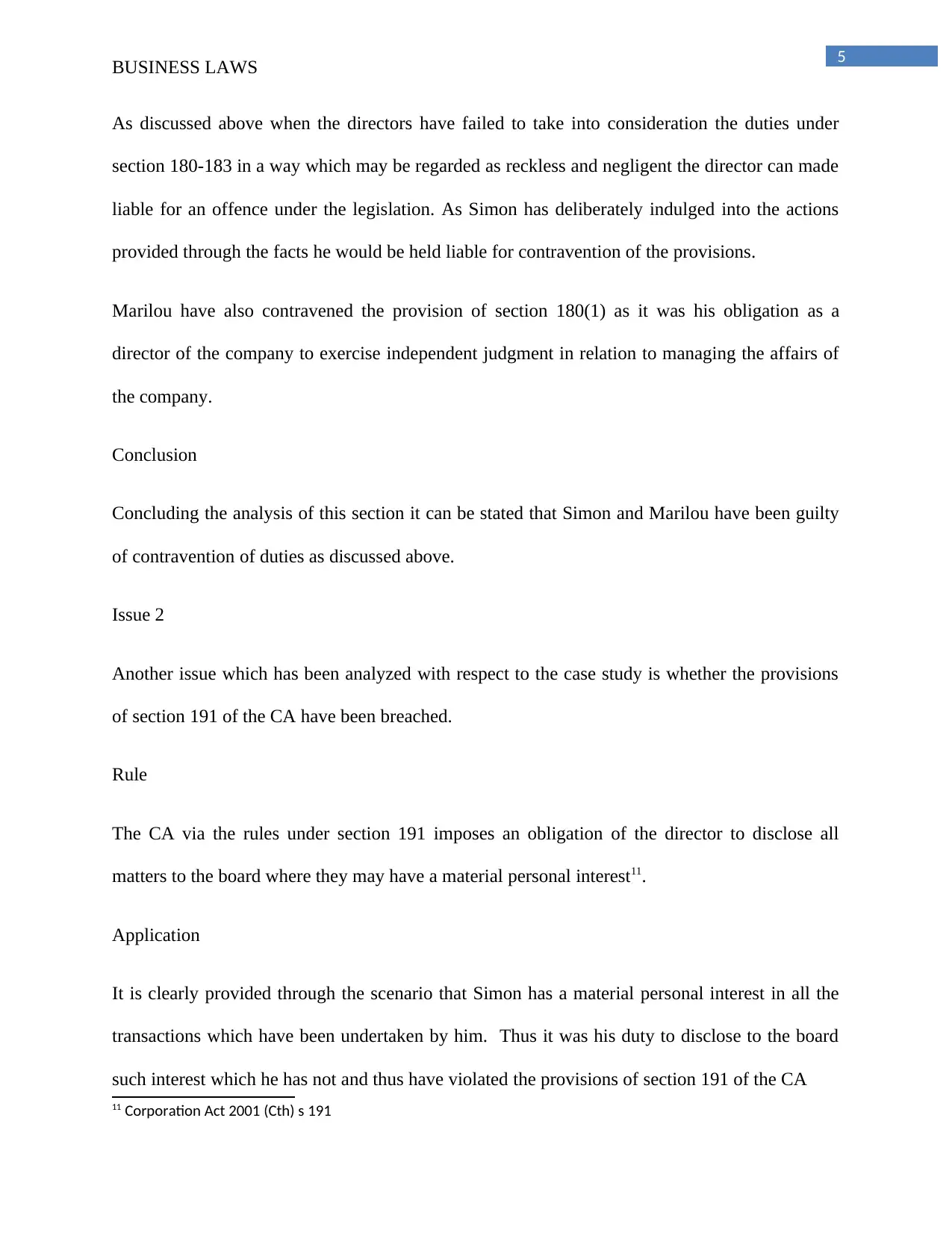
5
BUSINESS LAWS
As discussed above when the directors have failed to take into consideration the duties under
section 180-183 in a way which may be regarded as reckless and negligent the director can made
liable for an offence under the legislation. As Simon has deliberately indulged into the actions
provided through the facts he would be held liable for contravention of the provisions.
Marilou have also contravened the provision of section 180(1) as it was his obligation as a
director of the company to exercise independent judgment in relation to managing the affairs of
the company.
Conclusion
Concluding the analysis of this section it can be stated that Simon and Marilou have been guilty
of contravention of duties as discussed above.
Issue 2
Another issue which has been analyzed with respect to the case study is whether the provisions
of section 191 of the CA have been breached.
Rule
The CA via the rules under section 191 imposes an obligation of the director to disclose all
matters to the board where they may have a material personal interest11.
Application
It is clearly provided through the scenario that Simon has a material personal interest in all the
transactions which have been undertaken by him. Thus it was his duty to disclose to the board
such interest which he has not and thus have violated the provisions of section 191 of the CA
11 Corporation Act 2001 (Cth) s 191
BUSINESS LAWS
As discussed above when the directors have failed to take into consideration the duties under
section 180-183 in a way which may be regarded as reckless and negligent the director can made
liable for an offence under the legislation. As Simon has deliberately indulged into the actions
provided through the facts he would be held liable for contravention of the provisions.
Marilou have also contravened the provision of section 180(1) as it was his obligation as a
director of the company to exercise independent judgment in relation to managing the affairs of
the company.
Conclusion
Concluding the analysis of this section it can be stated that Simon and Marilou have been guilty
of contravention of duties as discussed above.
Issue 2
Another issue which has been analyzed with respect to the case study is whether the provisions
of section 191 of the CA have been breached.
Rule
The CA via the rules under section 191 imposes an obligation of the director to disclose all
matters to the board where they may have a material personal interest11.
Application
It is clearly provided through the scenario that Simon has a material personal interest in all the
transactions which have been undertaken by him. Thus it was his duty to disclose to the board
such interest which he has not and thus have violated the provisions of section 191 of the CA
11 Corporation Act 2001 (Cth) s 191
⊘ This is a preview!⊘
Do you want full access?
Subscribe today to unlock all pages.

Trusted by 1+ million students worldwide
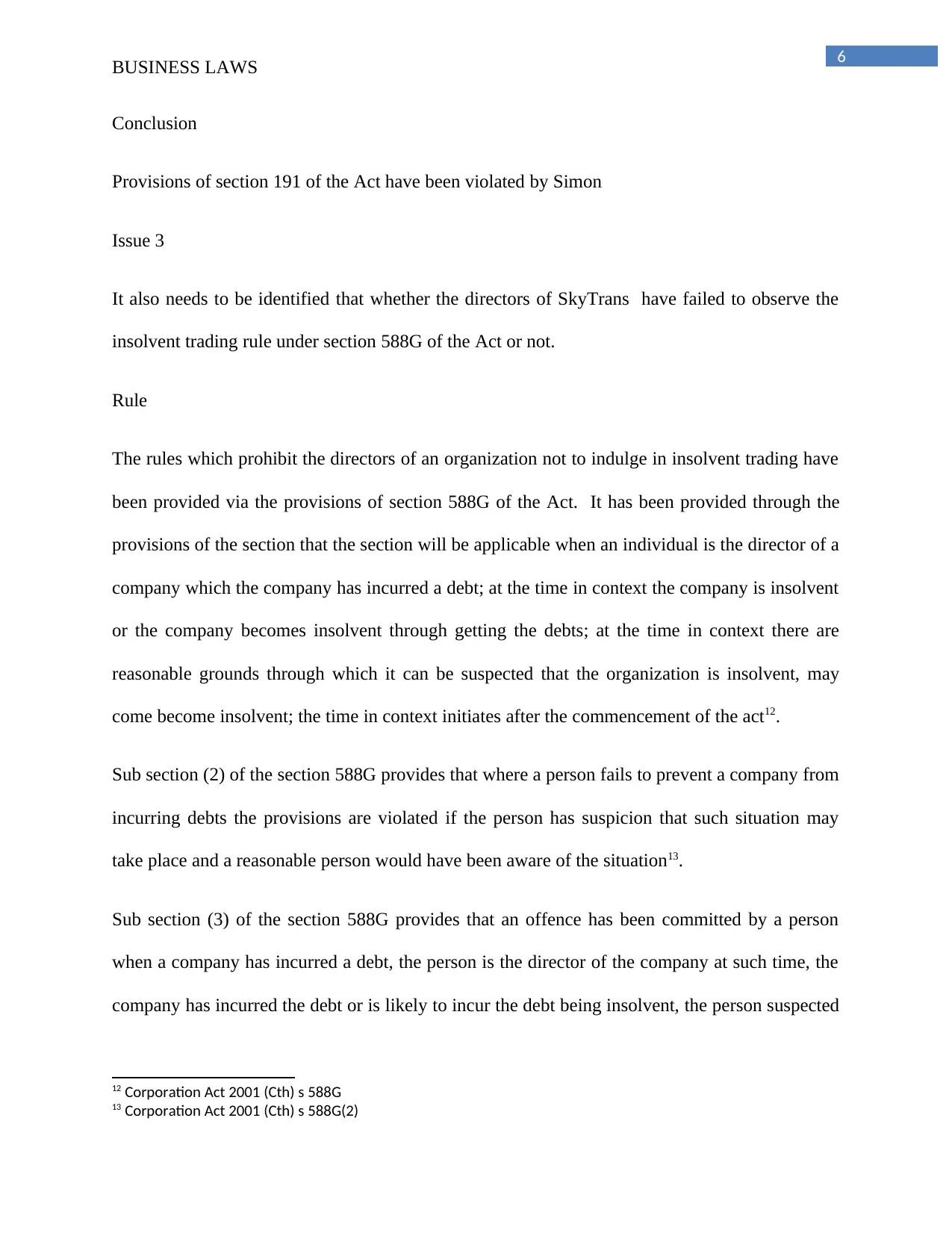
6
BUSINESS LAWS
Conclusion
Provisions of section 191 of the Act have been violated by Simon
Issue 3
It also needs to be identified that whether the directors of SkyTrans have failed to observe the
insolvent trading rule under section 588G of the Act or not.
Rule
The rules which prohibit the directors of an organization not to indulge in insolvent trading have
been provided via the provisions of section 588G of the Act. It has been provided through the
provisions of the section that the section will be applicable when an individual is the director of a
company which the company has incurred a debt; at the time in context the company is insolvent
or the company becomes insolvent through getting the debts; at the time in context there are
reasonable grounds through which it can be suspected that the organization is insolvent, may
come become insolvent; the time in context initiates after the commencement of the act12.
Sub section (2) of the section 588G provides that where a person fails to prevent a company from
incurring debts the provisions are violated if the person has suspicion that such situation may
take place and a reasonable person would have been aware of the situation13.
Sub section (3) of the section 588G provides that an offence has been committed by a person
when a company has incurred a debt, the person is the director of the company at such time, the
company has incurred the debt or is likely to incur the debt being insolvent, the person suspected
12 Corporation Act 2001 (Cth) s 588G
13 Corporation Act 2001 (Cth) s 588G(2)
BUSINESS LAWS
Conclusion
Provisions of section 191 of the Act have been violated by Simon
Issue 3
It also needs to be identified that whether the directors of SkyTrans have failed to observe the
insolvent trading rule under section 588G of the Act or not.
Rule
The rules which prohibit the directors of an organization not to indulge in insolvent trading have
been provided via the provisions of section 588G of the Act. It has been provided through the
provisions of the section that the section will be applicable when an individual is the director of a
company which the company has incurred a debt; at the time in context the company is insolvent
or the company becomes insolvent through getting the debts; at the time in context there are
reasonable grounds through which it can be suspected that the organization is insolvent, may
come become insolvent; the time in context initiates after the commencement of the act12.
Sub section (2) of the section 588G provides that where a person fails to prevent a company from
incurring debts the provisions are violated if the person has suspicion that such situation may
take place and a reasonable person would have been aware of the situation13.
Sub section (3) of the section 588G provides that an offence has been committed by a person
when a company has incurred a debt, the person is the director of the company at such time, the
company has incurred the debt or is likely to incur the debt being insolvent, the person suspected
12 Corporation Act 2001 (Cth) s 588G
13 Corporation Act 2001 (Cth) s 588G(2)
Paraphrase This Document
Need a fresh take? Get an instant paraphrase of this document with our AI Paraphraser
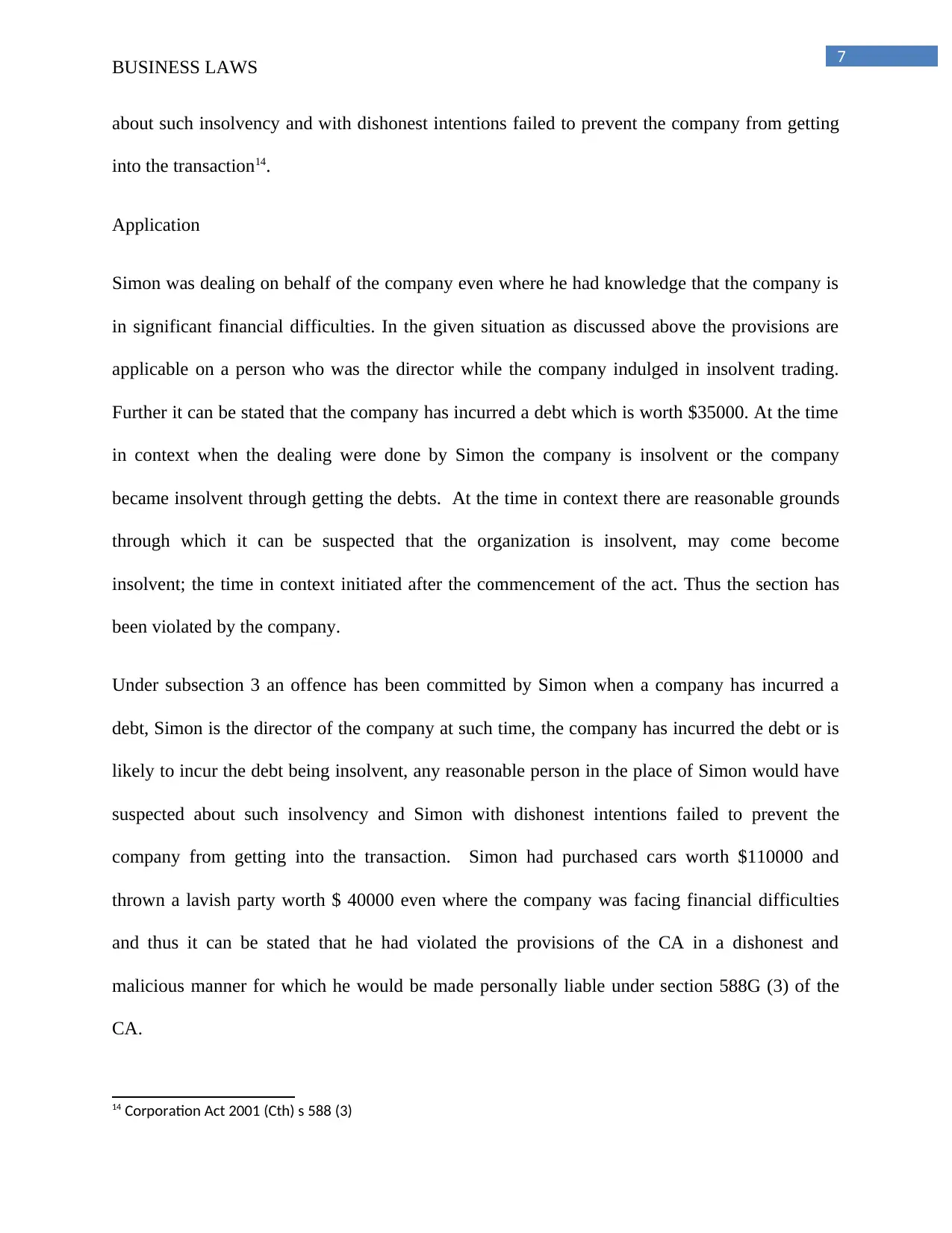
7
BUSINESS LAWS
about such insolvency and with dishonest intentions failed to prevent the company from getting
into the transaction14.
Application
Simon was dealing on behalf of the company even where he had knowledge that the company is
in significant financial difficulties. In the given situation as discussed above the provisions are
applicable on a person who was the director while the company indulged in insolvent trading.
Further it can be stated that the company has incurred a debt which is worth $35000. At the time
in context when the dealing were done by Simon the company is insolvent or the company
became insolvent through getting the debts. At the time in context there are reasonable grounds
through which it can be suspected that the organization is insolvent, may come become
insolvent; the time in context initiated after the commencement of the act. Thus the section has
been violated by the company.
Under subsection 3 an offence has been committed by Simon when a company has incurred a
debt, Simon is the director of the company at such time, the company has incurred the debt or is
likely to incur the debt being insolvent, any reasonable person in the place of Simon would have
suspected about such insolvency and Simon with dishonest intentions failed to prevent the
company from getting into the transaction. Simon had purchased cars worth $110000 and
thrown a lavish party worth $ 40000 even where the company was facing financial difficulties
and thus it can be stated that he had violated the provisions of the CA in a dishonest and
malicious manner for which he would be made personally liable under section 588G (3) of the
CA.
14 Corporation Act 2001 (Cth) s 588 (3)
BUSINESS LAWS
about such insolvency and with dishonest intentions failed to prevent the company from getting
into the transaction14.
Application
Simon was dealing on behalf of the company even where he had knowledge that the company is
in significant financial difficulties. In the given situation as discussed above the provisions are
applicable on a person who was the director while the company indulged in insolvent trading.
Further it can be stated that the company has incurred a debt which is worth $35000. At the time
in context when the dealing were done by Simon the company is insolvent or the company
became insolvent through getting the debts. At the time in context there are reasonable grounds
through which it can be suspected that the organization is insolvent, may come become
insolvent; the time in context initiated after the commencement of the act. Thus the section has
been violated by the company.
Under subsection 3 an offence has been committed by Simon when a company has incurred a
debt, Simon is the director of the company at such time, the company has incurred the debt or is
likely to incur the debt being insolvent, any reasonable person in the place of Simon would have
suspected about such insolvency and Simon with dishonest intentions failed to prevent the
company from getting into the transaction. Simon had purchased cars worth $110000 and
thrown a lavish party worth $ 40000 even where the company was facing financial difficulties
and thus it can be stated that he had violated the provisions of the CA in a dishonest and
malicious manner for which he would be made personally liable under section 588G (3) of the
CA.
14 Corporation Act 2001 (Cth) s 588 (3)
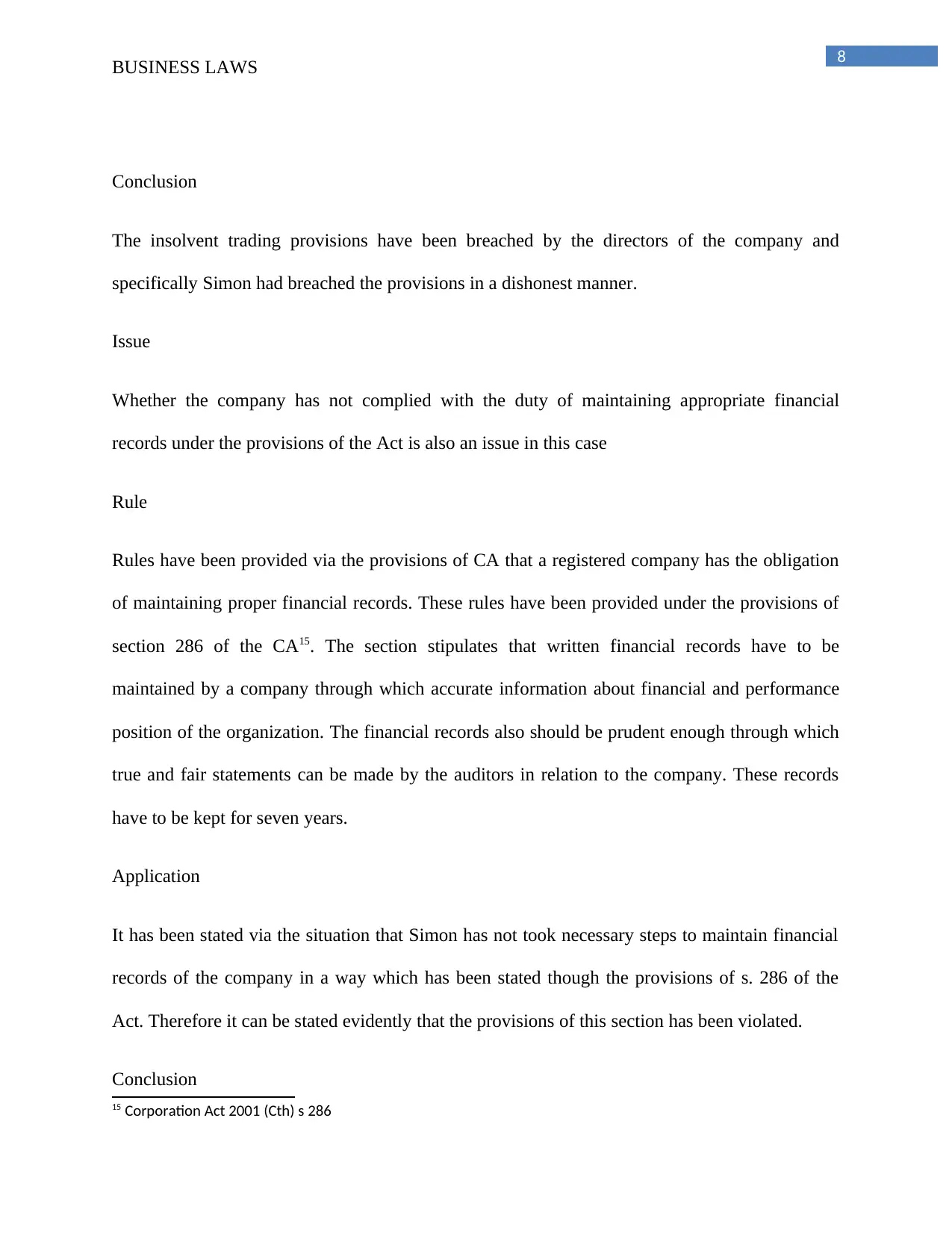
8
BUSINESS LAWS
Conclusion
The insolvent trading provisions have been breached by the directors of the company and
specifically Simon had breached the provisions in a dishonest manner.
Issue
Whether the company has not complied with the duty of maintaining appropriate financial
records under the provisions of the Act is also an issue in this case
Rule
Rules have been provided via the provisions of CA that a registered company has the obligation
of maintaining proper financial records. These rules have been provided under the provisions of
section 286 of the CA15. The section stipulates that written financial records have to be
maintained by a company through which accurate information about financial and performance
position of the organization. The financial records also should be prudent enough through which
true and fair statements can be made by the auditors in relation to the company. These records
have to be kept for seven years.
Application
It has been stated via the situation that Simon has not took necessary steps to maintain financial
records of the company in a way which has been stated though the provisions of s. 286 of the
Act. Therefore it can be stated evidently that the provisions of this section has been violated.
Conclusion
15 Corporation Act 2001 (Cth) s 286
BUSINESS LAWS
Conclusion
The insolvent trading provisions have been breached by the directors of the company and
specifically Simon had breached the provisions in a dishonest manner.
Issue
Whether the company has not complied with the duty of maintaining appropriate financial
records under the provisions of the Act is also an issue in this case
Rule
Rules have been provided via the provisions of CA that a registered company has the obligation
of maintaining proper financial records. These rules have been provided under the provisions of
section 286 of the CA15. The section stipulates that written financial records have to be
maintained by a company through which accurate information about financial and performance
position of the organization. The financial records also should be prudent enough through which
true and fair statements can be made by the auditors in relation to the company. These records
have to be kept for seven years.
Application
It has been stated via the situation that Simon has not took necessary steps to maintain financial
records of the company in a way which has been stated though the provisions of s. 286 of the
Act. Therefore it can be stated evidently that the provisions of this section has been violated.
Conclusion
15 Corporation Act 2001 (Cth) s 286
⊘ This is a preview!⊘
Do you want full access?
Subscribe today to unlock all pages.

Trusted by 1+ million students worldwide
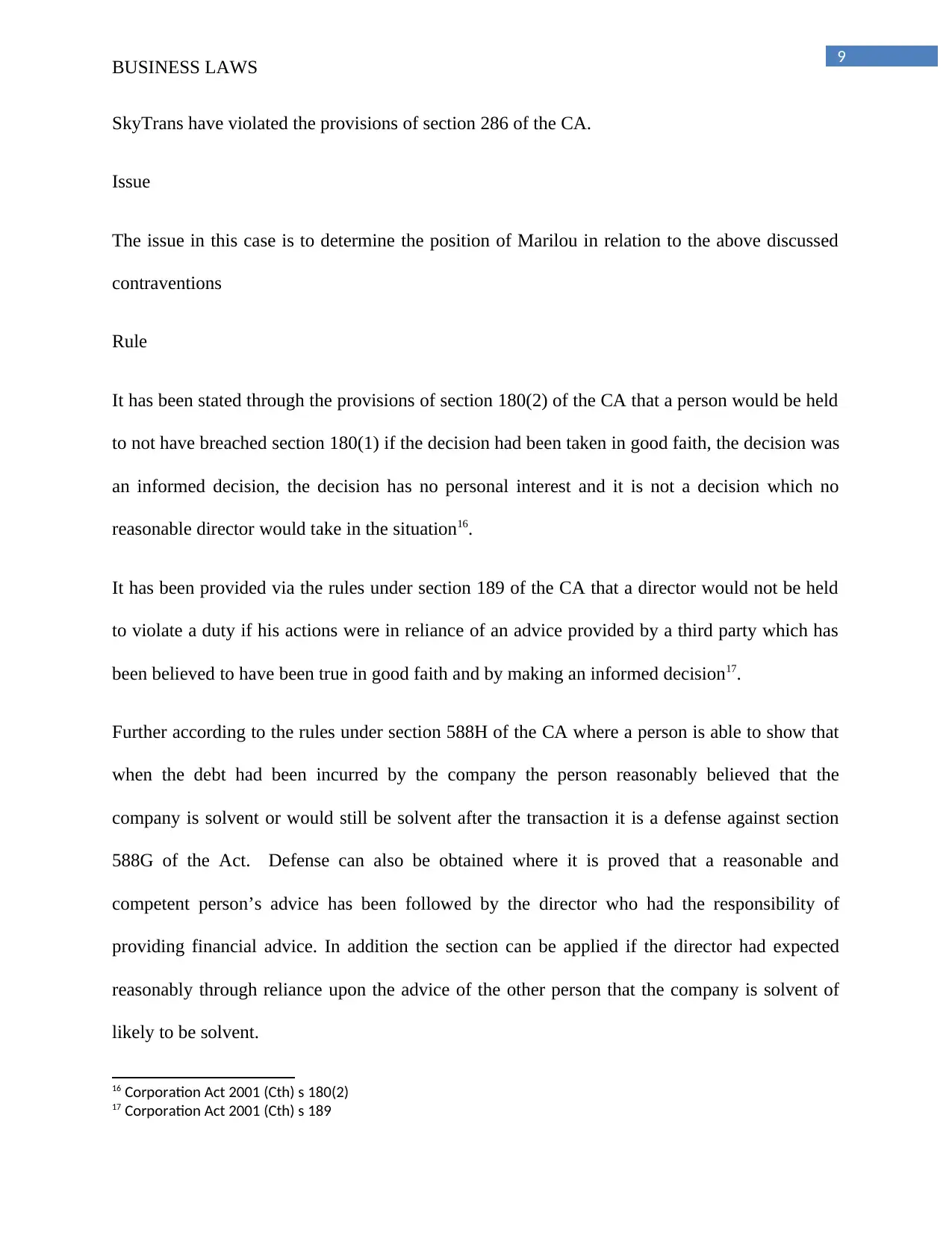
9
BUSINESS LAWS
SkyTrans have violated the provisions of section 286 of the CA.
Issue
The issue in this case is to determine the position of Marilou in relation to the above discussed
contraventions
Rule
It has been stated through the provisions of section 180(2) of the CA that a person would be held
to not have breached section 180(1) if the decision had been taken in good faith, the decision was
an informed decision, the decision has no personal interest and it is not a decision which no
reasonable director would take in the situation16.
It has been provided via the rules under section 189 of the CA that a director would not be held
to violate a duty if his actions were in reliance of an advice provided by a third party which has
been believed to have been true in good faith and by making an informed decision17.
Further according to the rules under section 588H of the CA where a person is able to show that
when the debt had been incurred by the company the person reasonably believed that the
company is solvent or would still be solvent after the transaction it is a defense against section
588G of the Act. Defense can also be obtained where it is proved that a reasonable and
competent person’s advice has been followed by the director who had the responsibility of
providing financial advice. In addition the section can be applied if the director had expected
reasonably through reliance upon the advice of the other person that the company is solvent of
likely to be solvent.
16 Corporation Act 2001 (Cth) s 180(2)
17 Corporation Act 2001 (Cth) s 189
BUSINESS LAWS
SkyTrans have violated the provisions of section 286 of the CA.
Issue
The issue in this case is to determine the position of Marilou in relation to the above discussed
contraventions
Rule
It has been stated through the provisions of section 180(2) of the CA that a person would be held
to not have breached section 180(1) if the decision had been taken in good faith, the decision was
an informed decision, the decision has no personal interest and it is not a decision which no
reasonable director would take in the situation16.
It has been provided via the rules under section 189 of the CA that a director would not be held
to violate a duty if his actions were in reliance of an advice provided by a third party which has
been believed to have been true in good faith and by making an informed decision17.
Further according to the rules under section 588H of the CA where a person is able to show that
when the debt had been incurred by the company the person reasonably believed that the
company is solvent or would still be solvent after the transaction it is a defense against section
588G of the Act. Defense can also be obtained where it is proved that a reasonable and
competent person’s advice has been followed by the director who had the responsibility of
providing financial advice. In addition the section can be applied if the director had expected
reasonably through reliance upon the advice of the other person that the company is solvent of
likely to be solvent.
16 Corporation Act 2001 (Cth) s 180(2)
17 Corporation Act 2001 (Cth) s 189
Paraphrase This Document
Need a fresh take? Get an instant paraphrase of this document with our AI Paraphraser
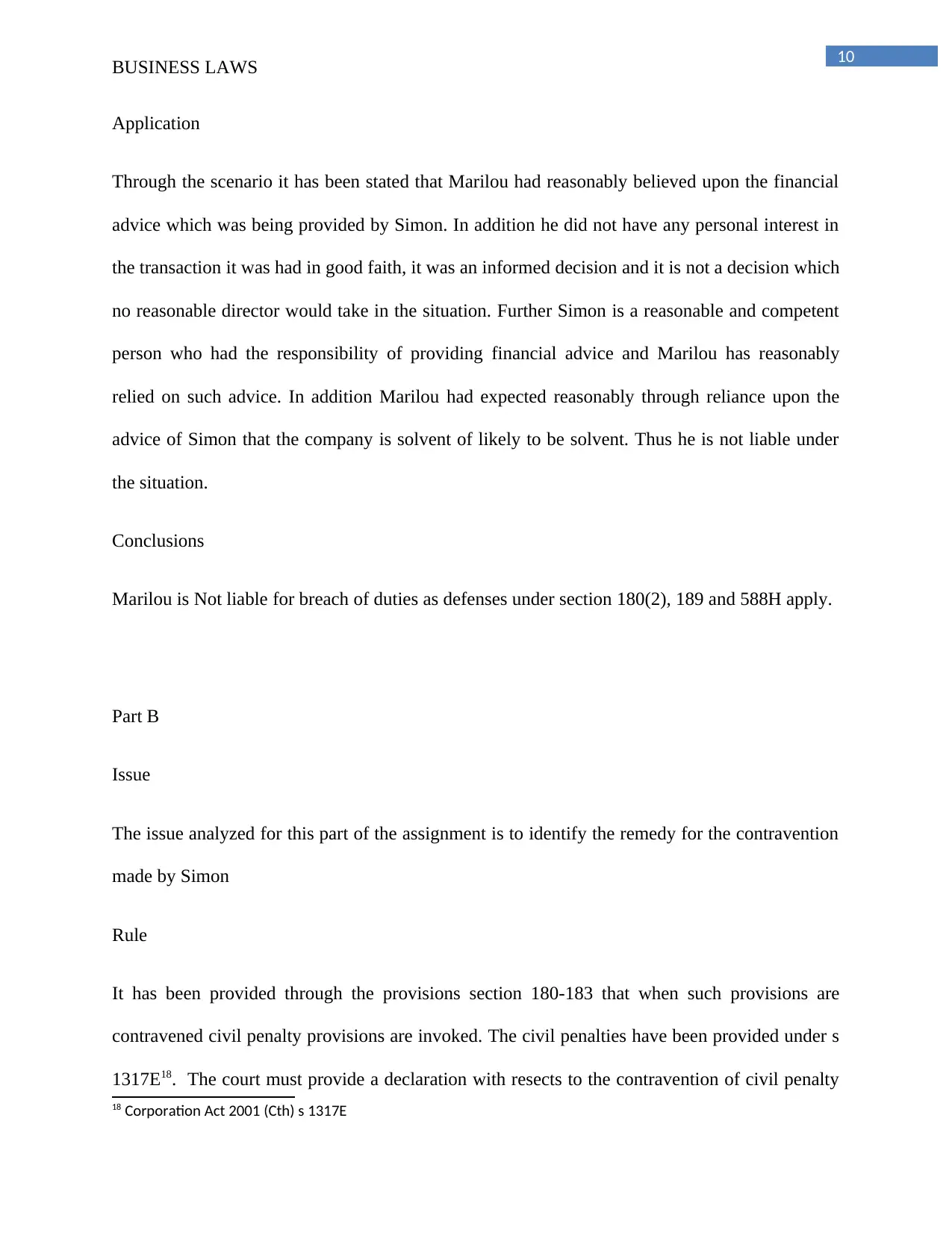
10
BUSINESS LAWS
Application
Through the scenario it has been stated that Marilou had reasonably believed upon the financial
advice which was being provided by Simon. In addition he did not have any personal interest in
the transaction it was had in good faith, it was an informed decision and it is not a decision which
no reasonable director would take in the situation. Further Simon is a reasonable and competent
person who had the responsibility of providing financial advice and Marilou has reasonably
relied on such advice. In addition Marilou had expected reasonably through reliance upon the
advice of Simon that the company is solvent of likely to be solvent. Thus he is not liable under
the situation.
Conclusions
Marilou is Not liable for breach of duties as defenses under section 180(2), 189 and 588H apply.
Part B
Issue
The issue analyzed for this part of the assignment is to identify the remedy for the contravention
made by Simon
Rule
It has been provided through the provisions section 180-183 that when such provisions are
contravened civil penalty provisions are invoked. The civil penalties have been provided under s
1317E18. The court must provide a declaration with resects to the contravention of civil penalty
18 Corporation Act 2001 (Cth) s 1317E
BUSINESS LAWS
Application
Through the scenario it has been stated that Marilou had reasonably believed upon the financial
advice which was being provided by Simon. In addition he did not have any personal interest in
the transaction it was had in good faith, it was an informed decision and it is not a decision which
no reasonable director would take in the situation. Further Simon is a reasonable and competent
person who had the responsibility of providing financial advice and Marilou has reasonably
relied on such advice. In addition Marilou had expected reasonably through reliance upon the
advice of Simon that the company is solvent of likely to be solvent. Thus he is not liable under
the situation.
Conclusions
Marilou is Not liable for breach of duties as defenses under section 180(2), 189 and 588H apply.
Part B
Issue
The issue analyzed for this part of the assignment is to identify the remedy for the contravention
made by Simon
Rule
It has been provided through the provisions section 180-183 that when such provisions are
contravened civil penalty provisions are invoked. The civil penalties have been provided under s
1317E18. The court must provide a declaration with resects to the contravention of civil penalty
18 Corporation Act 2001 (Cth) s 1317E
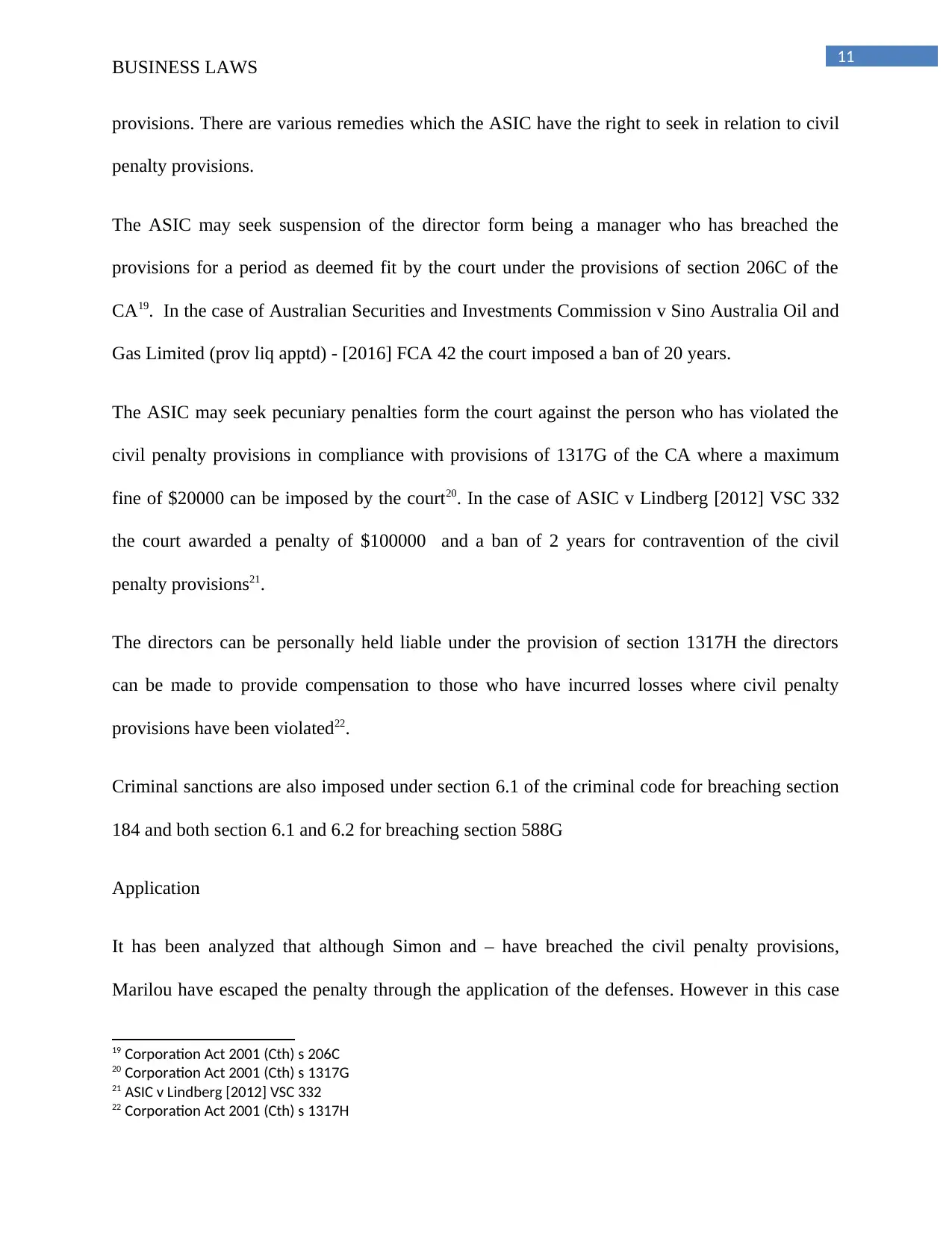
11
BUSINESS LAWS
provisions. There are various remedies which the ASIC have the right to seek in relation to civil
penalty provisions.
The ASIC may seek suspension of the director form being a manager who has breached the
provisions for a period as deemed fit by the court under the provisions of section 206C of the
CA19. In the case of Australian Securities and Investments Commission v Sino Australia Oil and
Gas Limited (prov liq apptd) - [2016] FCA 42 the court imposed a ban of 20 years.
The ASIC may seek pecuniary penalties form the court against the person who has violated the
civil penalty provisions in compliance with provisions of 1317G of the CA where a maximum
fine of $20000 can be imposed by the court20. In the case of ASIC v Lindberg [2012] VSC 332
the court awarded a penalty of $100000 and a ban of 2 years for contravention of the civil
penalty provisions21.
The directors can be personally held liable under the provision of section 1317H the directors
can be made to provide compensation to those who have incurred losses where civil penalty
provisions have been violated22.
Criminal sanctions are also imposed under section 6.1 of the criminal code for breaching section
184 and both section 6.1 and 6.2 for breaching section 588G
Application
It has been analyzed that although Simon and – have breached the civil penalty provisions,
Marilou have escaped the penalty through the application of the defenses. However in this case
19 Corporation Act 2001 (Cth) s 206C
20 Corporation Act 2001 (Cth) s 1317G
21 ASIC v Lindberg [2012] VSC 332
22 Corporation Act 2001 (Cth) s 1317H
BUSINESS LAWS
provisions. There are various remedies which the ASIC have the right to seek in relation to civil
penalty provisions.
The ASIC may seek suspension of the director form being a manager who has breached the
provisions for a period as deemed fit by the court under the provisions of section 206C of the
CA19. In the case of Australian Securities and Investments Commission v Sino Australia Oil and
Gas Limited (prov liq apptd) - [2016] FCA 42 the court imposed a ban of 20 years.
The ASIC may seek pecuniary penalties form the court against the person who has violated the
civil penalty provisions in compliance with provisions of 1317G of the CA where a maximum
fine of $20000 can be imposed by the court20. In the case of ASIC v Lindberg [2012] VSC 332
the court awarded a penalty of $100000 and a ban of 2 years for contravention of the civil
penalty provisions21.
The directors can be personally held liable under the provision of section 1317H the directors
can be made to provide compensation to those who have incurred losses where civil penalty
provisions have been violated22.
Criminal sanctions are also imposed under section 6.1 of the criminal code for breaching section
184 and both section 6.1 and 6.2 for breaching section 588G
Application
It has been analyzed that although Simon and – have breached the civil penalty provisions,
Marilou have escaped the penalty through the application of the defenses. However in this case
19 Corporation Act 2001 (Cth) s 206C
20 Corporation Act 2001 (Cth) s 1317G
21 ASIC v Lindberg [2012] VSC 332
22 Corporation Act 2001 (Cth) s 1317H
⊘ This is a preview!⊘
Do you want full access?
Subscribe today to unlock all pages.

Trusted by 1+ million students worldwide
1 out of 15
Related Documents
Your All-in-One AI-Powered Toolkit for Academic Success.
+13062052269
info@desklib.com
Available 24*7 on WhatsApp / Email
![[object Object]](/_next/static/media/star-bottom.7253800d.svg)
Unlock your academic potential
Copyright © 2020–2025 A2Z Services. All Rights Reserved. Developed and managed by ZUCOL.



![Analysis of Asden Developments Pty Ltd v Dinoris (No 3) [2016] FCA 788](/_next/image/?url=https%3A%2F%2Fdesklib.com%2Fmedia%2Fliquidator-breach-of-duties_page_2.jpg&w=256&q=75)

